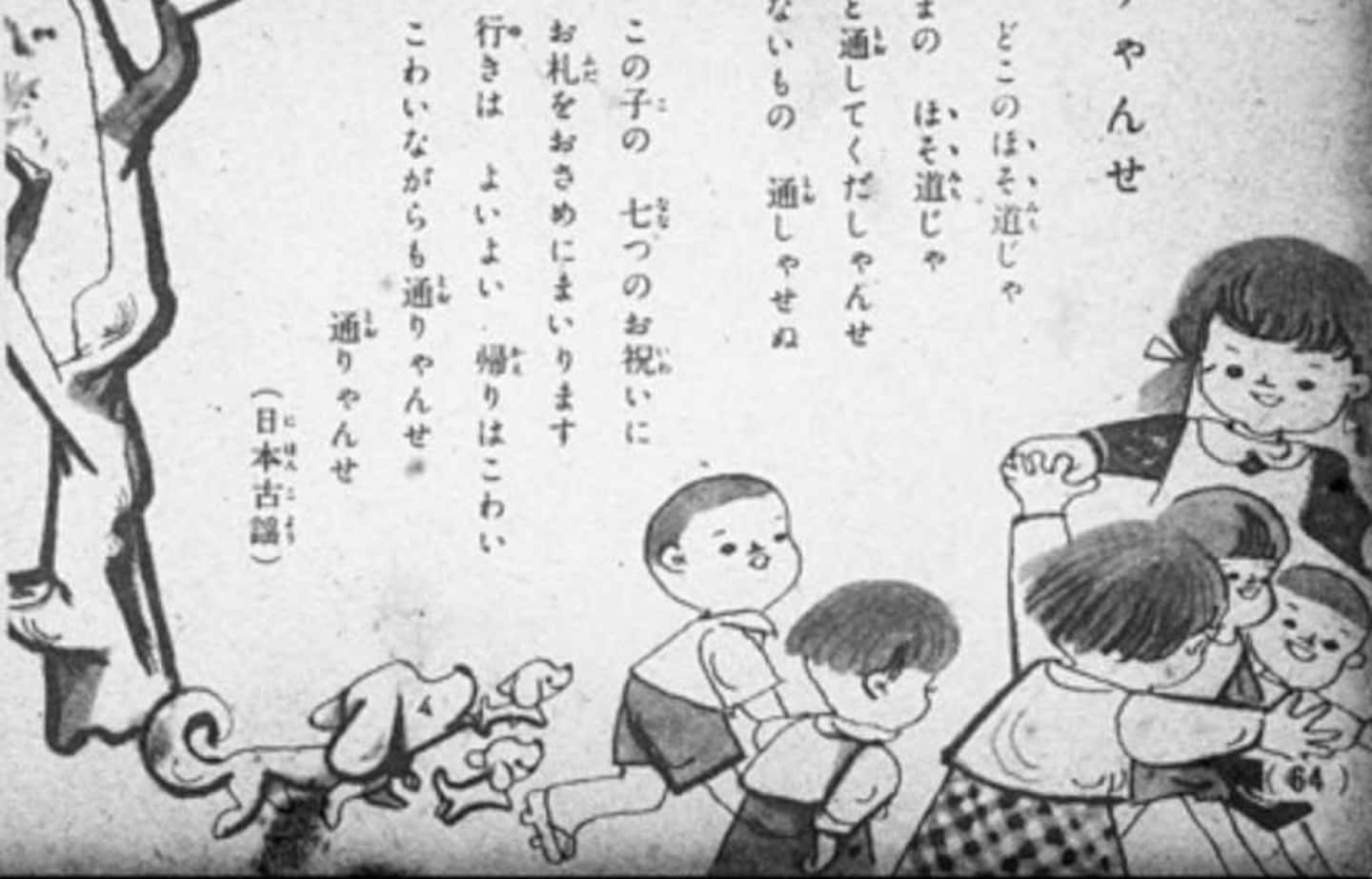5 Creepy Japanese Children's Songs
Warabe uta are traditional Japanese songs for children. Akin to nursery rhymes, they're often sung during games. They're the most innocent songs in the world—right? Well, maybe as long as you don't look deeper...
By Diletta Fabiani5. Hana Ichi Monme
https://www.youtube.com/watch?v=PrMipzC-WBY
Hana Ichi Monme is a typical Japanese children's game that involves a song coupled with another kids' favorite, jan-ken-pon (paper-rock-scissors). There are quite a few variantions on both the song and the game depending on where you live in Japan.
In one common version, the children are divided in two teams, and the members of each team hold hands, forming facing lines. One group starts singing the song and steps toward the other, following the melody, while the other team steps back. At the end of each line, the two teams change roles and directions:
A: Katte ureshii, hana ichi monme.
B: Makete kuyashii, hana ichi monme.
A: Ano ko ga hoshii.
B: Ano ko ja wakaran.
A: Sodan shiyo!
B: So shiyo!
A: We're so happy we won, hana ichi monme.
B: We're so upset we lost, hana ichi monme.
A: We want that kid.
B: We don't understand which kid you mean.
A: Let's talk about it!
B: Yes, let's do it!
The teams then discuss which player on the opposing team they'd like to "steal," and a final pair of lines is sung. SLet's say they decide on Mio-chan and Yuta-kun:
A: Mio-chan ga hoshii!
B: Yuta-kun ga hoshii!
A: We want Mio!
B: We want Yuta!
The two named children then play jan-ken-pon, with the loser joining the winning team. The game then continues until there are no more players in one of the teams.
"Hana ichi monme" means, "a flower is one monme." A monme was both a unit of mass and a unit of currency in the Edo Period (1603-1868), with a value of 3.75 grams of silver. And this is where the song gets dark.
Katte and makete in the first two lines can mean "win" and "lose," but using different kanji, they can also mean "buy" and "reduce the price," respectively. It's speculated that the song is actually about women selling their bodies or children being sold into slavery for the amount of one monme, with the seller being upset if the price is reduced. Suddenly children "buying" teammates seems much less innocent...
4. Teru-teru Bozu
https://www.youtube.com/watch?v=gxCWKG7rVuw
The Teru-teru Bozu is apparently a fairly innocent tradition. Teru means "to shine," as in sunshine, and bozu means "monk." When you want to wish for good weather, you create a simple ghost-like doll (bald like a monk) out of a white handkerchief and a string, then hang it in front of your house.
This tradition seemingly originated with farmers in the mid-Edo Period. If a doll was successful, eyes were drawn on its face, and it was then washed with sacred sake and thrown into the river to return it to its home among the gods. Nowadays the practice is largely carried on by children, who usually just hang them up if they want good weather for a school outing the next day.
https://www.youtube.com/watch?v=pnxMcNPE3Z4
The practice was common enough that it was immortalized in a warabe uta in 1921. However, reading the lyrics of the song, the story doesn’t seem to be so peaceful at all:
Teru-teru bozu, teru bozu
Ashita tenki ni shite o-kure,
Itsuka no yume no sora no yo ni.
Haretara kin no suzu ageyo.
Teru-teru Bozu, Teru Bozu
Do make tomorrow a sunny day,
Like the sky in a dream sometime.
If it's sunny I'll give you a golden bell.
Teru-teru bozu, teru bozu
Ashita tenki ni shite o-kure.
Watashi no negai wo kiita nara
Amai o-sake wo tanto nomasho.
Teru-teru Bozu, Teru Bozu
Do make tomorrow a sunny day.
If you make my wish come true
We'll drink lots of sweet sake.
Teru-teru bozu, teru bozu
Ashita tenki ni shite o-kure.
Sore de mo kumotte naitetara
Sonata no kubi wo chon to kiru zo.
Teru-teru Bozu, Teru Bozu
Do make tomorrow a sunny day.
But if it's cloudy and I find you crying (i.e. it's raining)
Then I shall snip your head off.
Why the sudden violence at the end? According to legend, a monk once promised farmers to stop the rain that was ruining their crops. When he failed in the task, he was executed.
However, another theory traces Teru-teru Bozu's origins back to a Chinese story introduced to Japan in the Heian Period (794-1185). In this story, a girl was sent out to save her city from a deluge by sweeping the clouds out of the sky with a broom. Known literally as "Sweeping Fine Weather Girl" (掃晴娘, pronounced So-Chin-Nyan in Chinese or Souseijo in Japanese), people would hang up paper cut-outs of a broom-carrying girl in the hope for fine weather. It's said that this gradually transformed into the Teru-teru Bozu we see today—though it offers no explanation for the head snip at the end!





